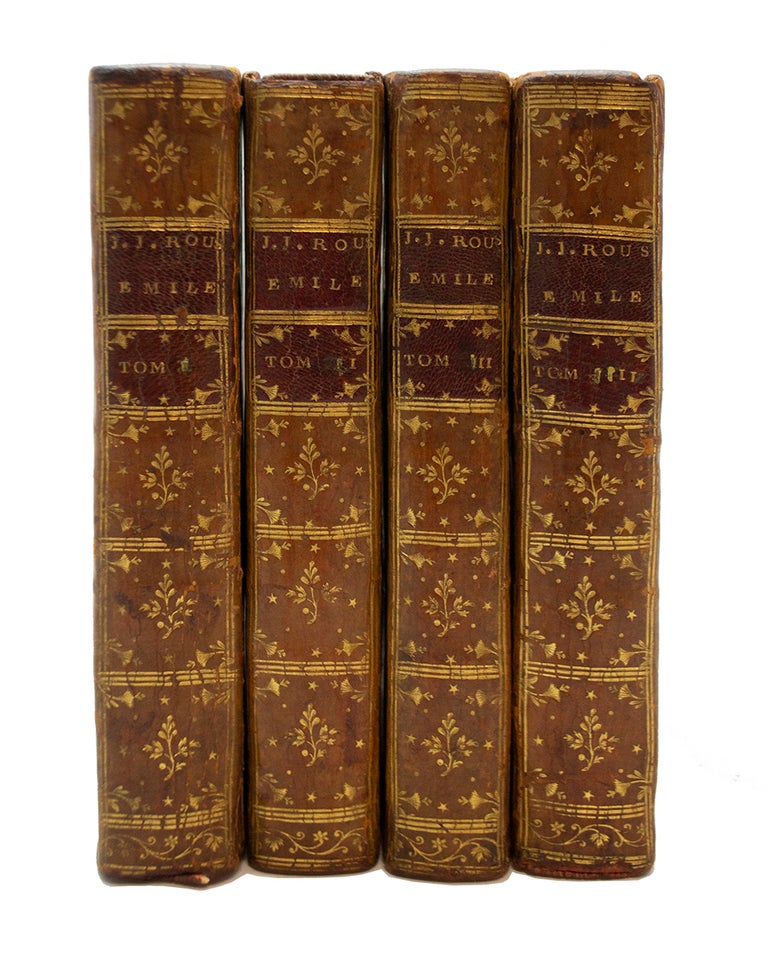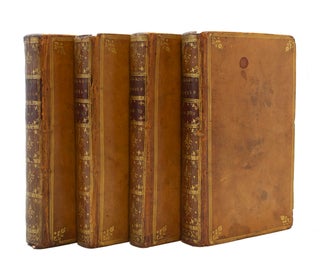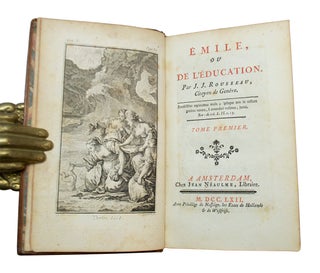First Edition, Twelvemo Issue of Rousseau’s Seminal Work On Education.
Emile ou De l'éducation.
Amsterdam: Chez Jean Néaulme, 1762.
Aamsterdam [i.e. Paris]: Chez Jean Néaulme, 1762.
First edition, twelvemo issue (priority between this and the octavo is still subject to discussion). Four twelvemo volumes (6 1/2 x 3 7/8 inches; 164 x 100 mm). [2], viii, [2], 466; [4], 407, [1, blank]; [4], 357, [1, blank], [361]-384; [4], 455, [1, blank], [4, “Privilegie”] pp. Bound with no the half-title in Volume I as usual, but with them present in Vols. II-IV (as called for). Blank leaf P12 excised in Volume III as usual. Leaf H4 misbound between H8 and H9 in volume II. Five engraved plates (including frontispiece in each volume) by De Longueil, Louis le Grand, and J.J. Pasquier, after Ch. Eisen. Titles printed in red and black.
Contemporary calf. Boards triple-ruled in gilt with floral corner devices. Spines stamped in gilt and each volume with two red morocco spine labels, lettered in gilt. Gilt board edges. Marbled endpapers. All edges dyed red. Some rubbing to boards and edges. Spines with some flaking. Boards with some soiling, mainly volume IV. Some chipping to heads and tails of spines and some light repair to head and tail of spines of volumes I and IV. A marginal tear to leaves N9 and N10 of volume II, tear just barely touching text on N9 and not touching text on N10. Overall a very good and crisp copy.
The publication history of the book is complicated. According to McEachern "In November 1761 [publisher Nicolas-Bonaventure] Duchesne signed an agreement with Jean Néaulme, a Dutch publisher chosen... to undertake an edition parallel to Duchesne's for distribution outside France... Duchesne's first edition appeared in two formats: a duodecimo with the false imprint 'A Amsterdam, Chez Jean Neaulme' and an octavo with the false imprint 'A La Haye, Chez Jean Néaulme.' The sheets of the duodecimo edition were printed first, and the pages then re-imposed for printing in octavo..." Although it is suggested that the twelvemo edition was printed first but the octavo edition may have been issued first, McEachern goes on to say "the question of the order of printing has not yet been resolved to everyone's satisfaction." (McEachern, Bibliography of the Writings of Jean-Jacques Rousseau, 16-17),
A first edition of Jean-Jacques Rousseau’s (1712-1778) seminal work on education. While Jean Néaulme of Amsterdam is given as the printer, it was, in actuality, printed by Parisian printer and publisher Nicolas Bonaventure Duchesne. When this work was published in the spring of 1762, it was banned by the Paris parliament and burned in public in Rousseau’s home town of Geneva and in Paris, forcing Rousseau to flee. This title was referred to by Goethe as “the natural gospel of education” and had great influence on Rousseau’s European contemporaries, especially educators. Despite the controversy, Émile contributed mightily to the Romantics appreciation of nature and to the notion of the “noble savage.”
“To be good is to exist in accordance with the intrinsic potentialities of one’s nature, and Émile seeks to trace the natural development of a human being brought up in the country away from the nefarious influence of contemporary social life. From this point of view the work is not just a manual of education but, as Rousseau himself points out, a philosophical treatise on the goodness of human nature. It is less concerned with laying down the practical details of a specific pedagogic method than with describing the fundamental principles which underlie the whole of man’s development from infancy to maturity. Rousseau’s ultimate object is to teach the art of living, for man’s first duty, he says, is to be human” (The Encyclopedia of Philosophy).
McEachern 1b. Dufour 187. Printing and the Mind of Man 207 note (entry for the Du contract social).
HBS 68672.
$5,000.
Price: $5,000.00
Item #68672



